The Earth Is Not a Cold Dead Place Pitchfork Review
A complete statement
The Earth Is Not A Cold Dead Identify is maybe the definitive post-rock anthology, its cascading notes and shimmering altercation soaring and plummeting over 45 minutes filled with euphoria, hope and heart-pausing drama. No wonder it inspired countless bands to turn up the mix control on their reverb pedals and start tremolo picking.
Released in 2003, the anthology was the Texas band's 3rd in four years after How Strange, Innocence and Those Who Tell The Truth Shall Dice, Those Who Tell The Truth Shall Live Forever. For many fans, it'south their nigh complete argument, gentler and more emotive than its predecessors, lighter in shade than albums by other post-stone contenders of the fourth dimension such as Mogwai, 65daysofstatic and Godspeed You! Black Emperor.
Beyond its five tracks, hither is an album that despite the seemingly bleak title surges with optimism and the elemental joy of being alive. The subtly shifting repetition, dialogue and almost classical dynamics of the band's iii guitarists Munaf Rayani, Mark Smith and Michael James are revelatory.
Nothing they play is hugely difficult to replicate, the brilliance instead lies in the compositional vision. Equally the trio's patterns trip the light fantastic toe and weave around each other, icy melodic phrases are given enough space to cut to the cadre, tension building and breaking relentlessly like waves crashing on the rocks. All the while the feeling is alike to being safe at the heart of a swell storm raging around you.
Hope is important
The Earth Is Not A Cold Dead Place is an album about hope. Listening to the tape on vinyl is a luxuriant experience. Its cover, designed by Esteban Rey, bears its titular argument scrawled over and over in stark blackness handwriting, a defiantly positive mantra in the post-9/xi landscape. "That manner we could kind of imagine that information technology was written by someone who sees all the horror and terror of the world, merely who is also trying to look at all the wonderful and beautiful things," explained drummer Chris Hrasky.
And so at that place'due south the unproblematic life-affirming etching on the D-side of the record, which reads "The Earth is not a cold dead place considering you lot are animate, because you lot are listening". And the title of this sublime album's majestic opening track, First Breath After A Blackout. But let yourself to imagine the surge of emotions that restorative inhalation of life itself would stir. That's what this remarkable slice of music represents.
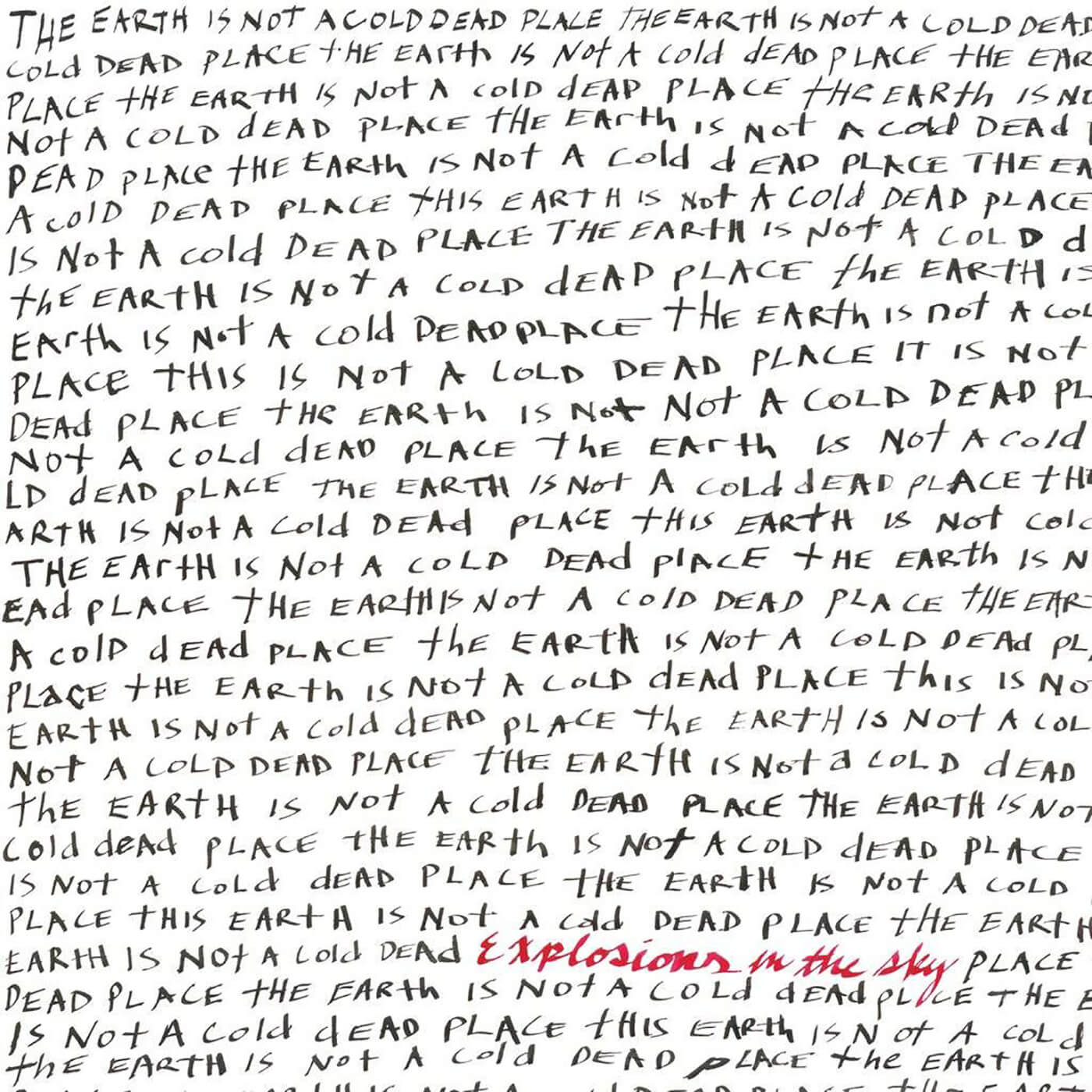
Beginning equally a unmarried A note played at the 17th fret of the top Eastward cord, its icy delayed repeats hang beatifically to a higher place the states earlier a quiet drumbeat mimics a human heartbeat, tremolo picking begins to rise and a second and so tertiary guitar are introduced, countermelodies ebbing and flowing along with crashing cymbals and a military-like snare whorl. At 5 minutes, in that location'southward a brief respite as sparkling audio on sound repeats and sleigh bells dance tantalisingly around a low tremolo-picked line, then the song rises to a huge crescendo, that heavenly riff repeating to the conclusion.
Emerging from an unsettling noisy squall, The Only Moment We Were Alone is 10 minutes of transportive bliss, a symphonic collision of beauty and beast as simplistic chiming phrases requite way to moments of crushing distortion, layer later on layer of guitar joining the swelling cacophony.
It's an incredibly emotive piece of instrumental music that segues seamlessly into the following Vi Days At The Lesser Of The Ocean. In that location's even hope on that tertiary runway, viewed by the ring as the album's darkest moment. The song was inspired by a Tv set news story about the Russian sailors trapped on the sinking Kursk nuclear submarine in 2000. Hrasky has described this slice every bit "kind of frightening and scary and lone".
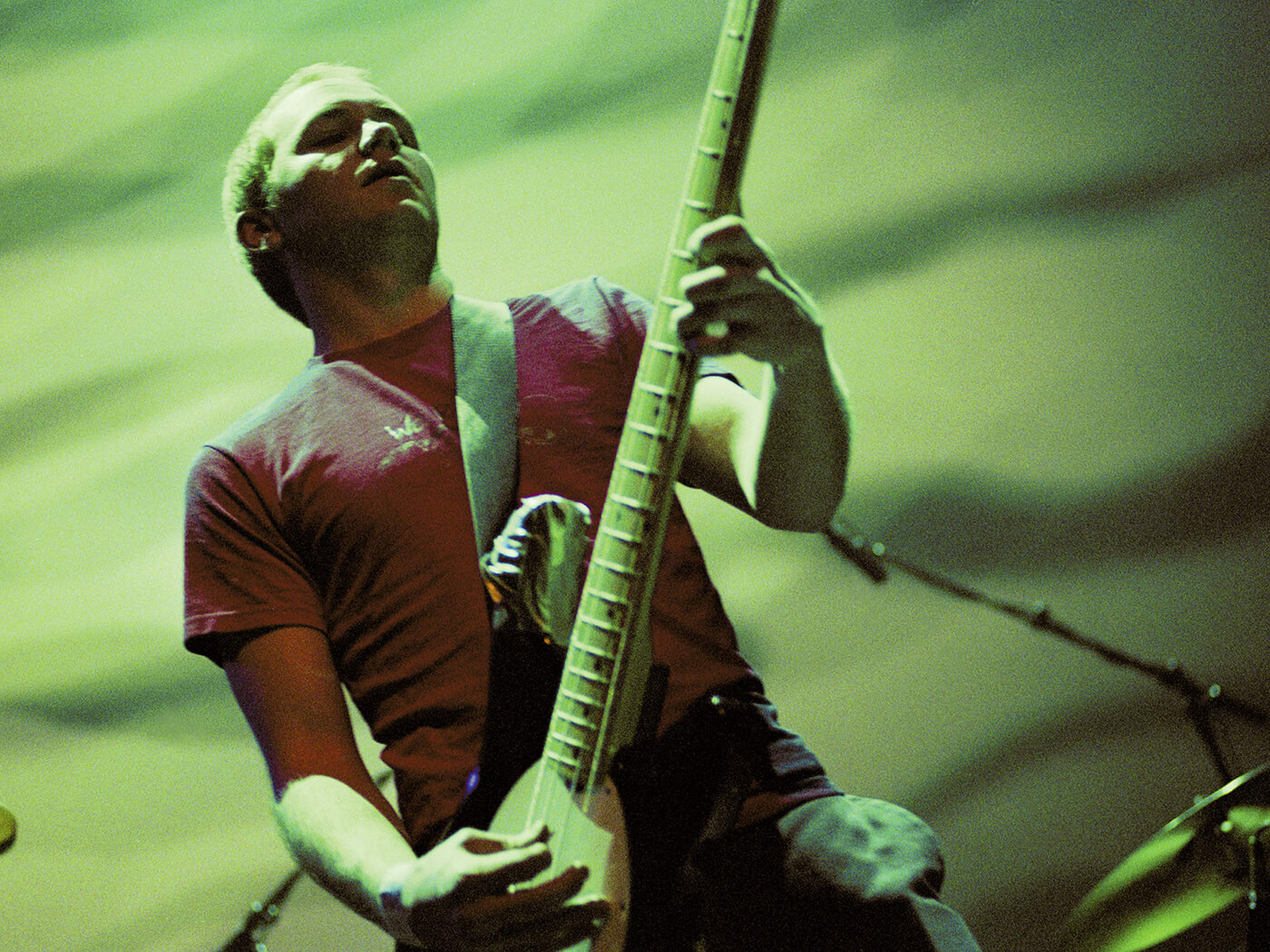
The final track, Your Hand In Mine, is a towering masterpiece and perhaps the ring's defining musical statement. Again information technology builds from a unmarried chiming arpeggio to something huge and triumphant in its final minutes earlier falling away to that single one-note riff that fades gradually to black, Explosions In The Heaven in microcosm.
Suitcases full of pedals
Y'all might assume that the The World Is Non A Cold Dead Place's ethereal splendour could only have been possible every bit the outcome of a serious haul of bazaar gear. You lot'd be wrong. By the time of the ring'due south 3rd anthology, Smith was playing a Fender Toronado, Rayani an affordable Strat and James an Ibanez Talman. Their amps of selection the Fender Twin and Fender Dual Showman Reverb, there was nothing fancy on their pedalboards either – in fact until recently, the ring didn't even ain pedalboards.
Paul Gregory, of Explosions' Bella Union labelmates and one-time touring partners Lanterns On The Lake, recalls: "They're so humble. They don't have pedalboards, they just behave their stuff around in suitcases. Every night they'd set up their pedals upward on the floor. I'd exist thinking, 'you guys are mad!' All their gear is beat to hell. They're a band I became obsessed with though, touring with them was incredible."
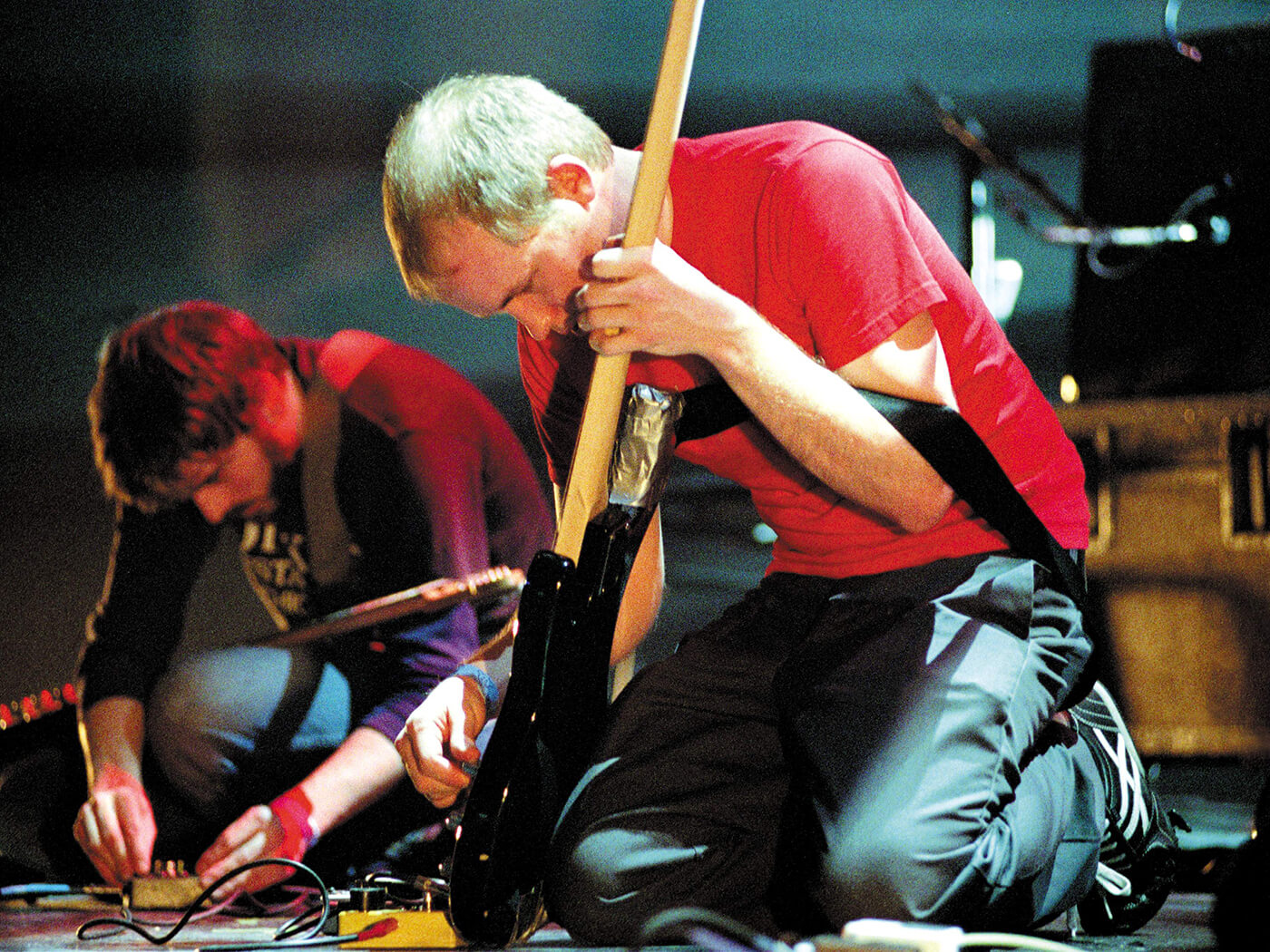
Delving inside those suitcases, all three guitarists swear past the now-discontinued Dominate RV-3, which they stockpile in case of breakages, preferring it to more recent iterations of the reverb pedal. The venerable Line 6 DL4 and the unheralded Ibanez DE7 are their filibuster pedals of selection. Information technology's all the more than remarkable – and inspiring – that Explosions In The Sky built this celestial masterpiece using every-day gear.
Quite a mode to go
The Guardian'southward original review of The Globe Is Not A Cold Dead Identify raved virtually "tunes that twinkle and thunder similar exploding stars". Uncut called the album "a formidable sit-in of what can still be done with guitars". While Drowned In Audio's 9/ten review noted "Guitars chime, bass rattles, drums combust. If the end really is nigh, and then information technology'southward quite a mode to become".
So, is this the ultimate mail-stone album? We'd happily argue that it is. All the same the ring recoil at the notion they're fifty-fifty part of that genre. "We don't consider ourselves post-stone at all," Rayani has said. "Nosotros consider ourselves a stone ring."
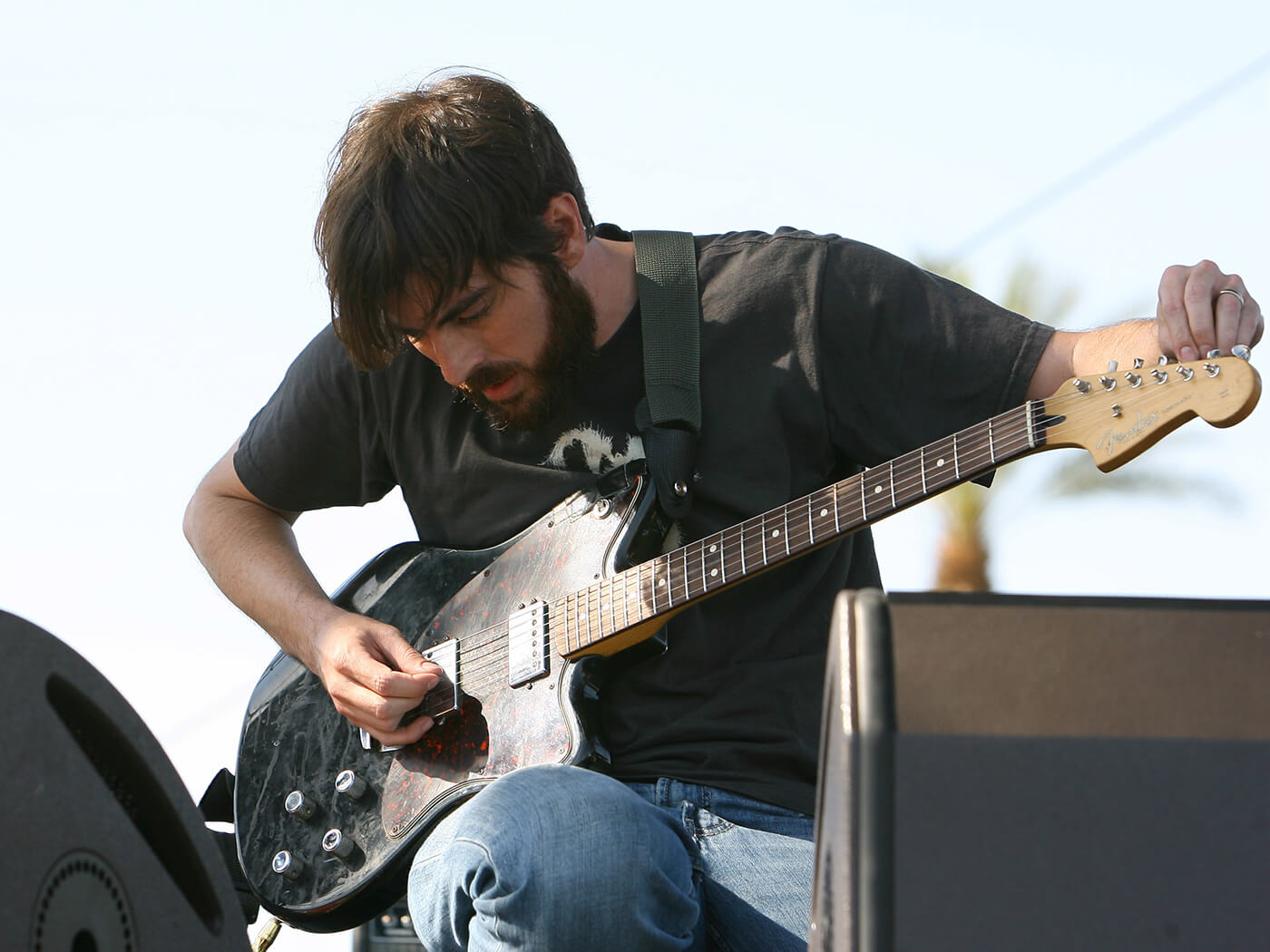
Regardless, 17 years from its release, this astonishing album is treasured past fans and has inspired hundreds of post-rock bands to follow in its wake. The record's cinematic movements take unsurprisingly provided rich pickings for film and Idiot box soundtracks over the years – indeed the band themselves recorded a shortened, string-accompanied version of Your Hand In Mine (aslope a batch of original music) to provide the crescendo of critically acclaimed 2004 picture, Fri Night Lights.
Explosions In The Heaven take gone on to create release four further albums of blissful, stratospheric guitar music, along with several picture show soundtracks, simply they've never eclipsed the coruscating grandeur and promise of The Earth Is Not A Cold Dead Place.
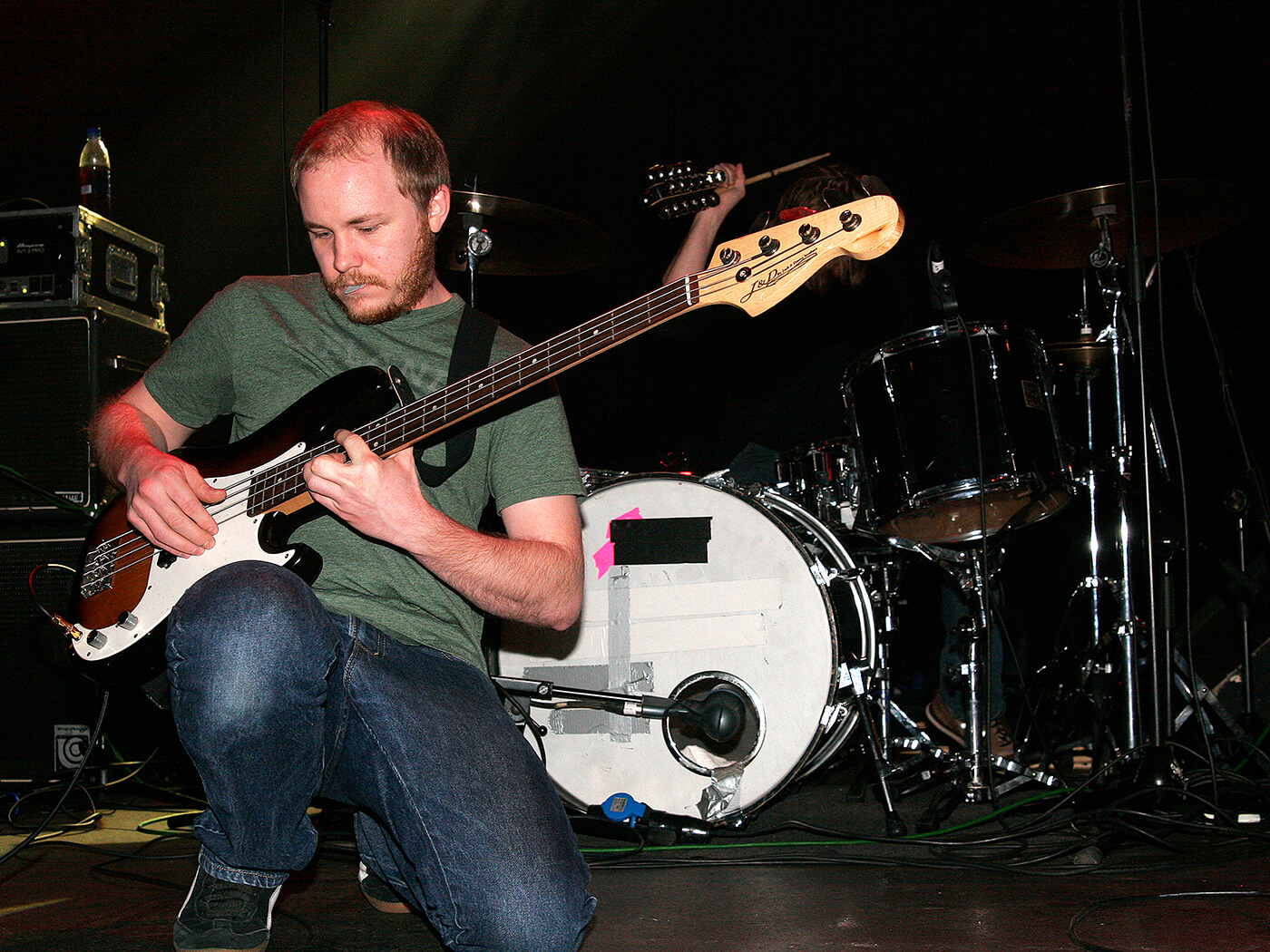
Infobox
Explosions In The Heaven, The Earth Is Not A Cold Dead Place (Temporary Residence/Bella Union, 2003)
Credits
- Munaf Rayani (guitars)
- Michael James (guitars/bass)
- Marking T Smith (guitars)
- Christopher Hrasky (drums)
- Recorded and engineered by John Congleton
Standout guitar moment
The Simply Moment We Were Alone
More than information about Explosions In The Heaven hither. For more features, click hither.
Source: https://guitar.com/review/album/the-genius-of-explosions-in-the-sky-the-earth-is-not-a-cold-dead-place/